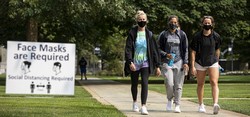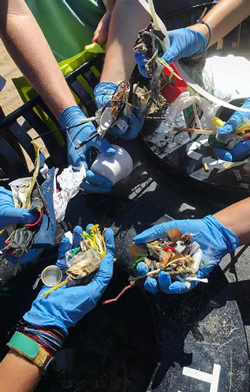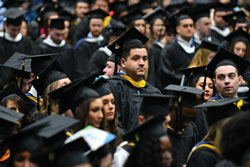This year’s Super Bowl XLVIII at MetLife Stadium in East Rutherford, NJ will host over 80,000 people and attract thousands more creating an enticing location for sex trafficking.
Sex trafficking, defined by the Human Trafficking Prevention Protection and Treatment Act, is the recruitment, harboring, transportation, provision, or obtaining of a person for the purpose of a commercial sex act.
Clemmie Greenlee, a sex trafficking survivor and advocate working to prevent sex trafficking, told the Times-Picayune that during her time as a victim she was forced to work a significant amount more around the time large sporting events to meet the needs of the increased customers.
“When they come to these kinds of events, the first thing you’re told is how many you’re going to perform a day,” Greenlee said. “You’ve got to go through 25 men a day, or you’re going through 50 of them. When they give you that number, you better make that number.”
Large sporting events, such as the Super Bowl, are known for causing an increase in sex trafficking, Chloe Contarino, Director of Development at Love-True, an organization fighting to end sex trafficking in America, said. “Unfortunately, due to the mass collection of men at one single event, there is more of a demand for purchased sex at events like the Super Bowl, the Olympics, and the World Cup,” said Contarino.
In response to the belief that trafficking increases during events like the Super Bowl, the state of NJ has prepared numerous trafficking prevention initiatives since the location of the game was announced, media outlets report.
Organizations fighting to prevent sex trafficking have created programs, information sessions and volunteer operations over the past few months to educate the public about the issue and how to prevent and react to it. “We’re going into hotels around mostly the Meadowlands area and educating the hotel managers and staff on the signs of human trafficking and asking them to put these mini soap bars in hotel bathrooms,” said Sue Flynn, the Chairman of the New Jersey Junior Leagues State Public Affairs Committee.
The information session that Flynn attended on Jan. 25 and 26, called the S.O.A.P. Outreach, included presentations about trafficking to raise awareness and educate students, parents, and any other personnel that may witness or have the opportunity to prevent sex trafficking around the area.
The event also welcomed volunteers to label bars of soap with the national human trafficking hotline to show sex trafficking victims that help is available, Flynn explained.
To further prepare for the Super Bowl, John Comiskey, a criminal justice professor at the University, said even national homeland security is keeping watch to prevent sex trafficking. “High level criminals and terrorists … see this as an opportunity to make money, a lot of money,” said Comiskey. “The proceeds of this human trafficking, these crimes, these inhumane crimes, are being used to finance terrorism.”
In a recent study, the Polaris Project, a Washington DC-based nonprofit, found that a pimp can make up to $632,000 in one year from four women/men. “One teenage girl was forced to meet the quotas of $500/night, 7 days a week and gave the money to her trafficker each night,” the study completed in 2012 stated.
Comiskey stated that the Department of Homeland Security and the Department of state are working to maintain control, “…you are looking at a number of agencies, primarily the Department of State and the Department of Homeland Security working with our international communities with immigration controls and border security.”
Though many believe that trafficking is increased during large sporting events, much debate has arisen to whether trafficking does not increase, and is a consistent issue heightened by the media, although, there are not any available statistics able to confirm this belief.
Flynn said that during any large sporting events there is a slight increase in human trafficking, although it is also an ever-present problem that is occurring throughout the nation every day of the year.
The Polaris Project stated, “This is a crime that demands attention, vigilance and resources to fight it in our communities 365 days a year.” Not only does trafficking occur every day, it is also occurring in every state of America, The National Human Trafficking Resource Center found in a study.
Why Sex Trafficking is an Issue Nationwide
The reason that sex trafficking has become so common is explained by Louise Shelley in her book, “Human Trafficking: A Global Perspective.” Shelley says, “Human trafficking is one of the fastest growing criminal enterprises because it holds relatively low risk with high profit potential.”
Shelley explains that criminals are attracted to the trafficking because, “unlike drugs, humans can be sold repeatedly.” She also states that there is no legal limit to how many times a person can be sold or will stop the act from happening, unless caught.
“Human trafficking is pervasive and it’s not delegated to some third world country or part of the world that we don’t really travel to,” Don Moliver, Dean of the Leon Hess Business School, said during the November sex trafficking seminar. “It takes place in our own backyard.”
Holly Austin Smith is an example of just how often trafficking can occur and at any location including small suburban areas. Austin Smith is a trafficking survivor and the author of, “Walking Prey,” a book describing youth’s vulnerability to sex slavery in America. She was 14-years-old when she was lured into trafficking in a mall in Atlantic City, NJ.
“After exchanging numbers, this man called at night while my unknowing parents watched television in the living room,” Austin Smith said. She explained that the man called her often and got to know her. He convinced her, like most pimps do, that they were in a relationship until the point that she trusted him enough to run away with him.
“Within hours of running away with a man who turned out to be a manipulative and menacing pimp, I was forced and coerced into working in Atlantic City, New Jersey until dawn the next day,” Austin Smith said.
The Polaris Project found that the average age a victim is taken and sold for sex in America is between 12 and 14 years old. They also reported that on average, 100,000 children are forced into trafficking every year, although this is hard to determine accurately because many cases go unreported.
Trafficking, unlike prostitution, includes the buyer of sex, the seller of sex and a pimp/trafficker who controls the transaction.
Any child under the age of 18, according to the Human Trafficking Prevention Protection and Treatment Act, is considered a victim of trafficking, not prostitution. “There’s no belief in New Jersey that if you’re under the age of 18 in the commercial sex industry that you choose to be a prostitute,” Flynn said.
In order to lure or trap young women and men into the commercial sex trade, pimps use force, fraud and coercion. Force can include any form of beating, burning, sexual assault, rape, or torture. Fraud can include false promises, deceitfulness, lying, preying, withholding money or blackmail. Coercion can include threats, intimidation, controlling a victim’s daily life, and causing victims to feel dependent upon them, thus inhibiting them from escaping, as defined by the Polaris Project.
Flynn explains that pimps use what is known as grooming or seasoning, to prepare victims for commercial sex with strangers, “…they show them love and affection and then all of a sudden there’s a switch, now I have done all this for you, you need to pay me back,” Flynn said.
The trafficking victims must also follow all of the pimp’s commands, the Polaris Project states. Including commands such as when to sleep, eat and how to walk, ensuring that the pimp gains full control.
Lisa Dinella, associate professor in psychology, said based on her research she found that “forty-three percent of the women reported trying to leave the sex industry multiple times… Others reported returning for economic reasons, sometimes to support their now existing drug habits.”
They are controlled and abused to the point that finding a way out is very difficult. Greenlee told the Huffington Post, “There’s no such thing as we want to go back to these guys.”
Greenlee explained that while in the situation, the victims feel that nobody is able to protect them. “They’re terrified,” she said. “You can say you’re going to save us, you can say we don’t have to worry about the pimps no more. We already know what power they have shown us. So either you come back to them, or you find out two days later they either got your grandmother or they just broke your little baby’s arm,” Greenlee added.
The psychological issues that are caused by these forms of trickery can be very damaging to the victim. “Methods that keep women in the sex industry include restricting women’s freedom to go where she chooses, promoting or forcing drug and alcohol dependency, using pornography as educational tools for women underage, and seventy percent of U.S. women noted physical and sexual violence from the pimps,” Dinella said.
There is Hope
In an effort to heal and support victims trying to leave the commercial sex industry, Love-True plans to create the first home for underage victims of domestic sex trafficking in New Jersey.
Flynn explains that there is a benefit to the increased media exposure of trafficking during sporting events like the Super Bowl, the increased exposure and informational sessions draw awareness to the epidemic and ways to prevent it in the future.
Nora Smith, associate social work professor at the University, attended a Trafficking Awareness Community Forum on Jan. 11 sponsored by the Episcopal Diocese of New Jersey, the All Saints Church of Navesink to discuss trafficking awareness in regards to the Super Bowl. “I became more informed about the topic of human trafficking in general, beyond the Super Bowl, more than expected,” Smith said.
One of the reasons that abolishing slavery was successful the first time is that it was completely visible,” Contarino said. “We need to inspire outrage once more. This is such a hidden problem and the majority of Americans have no idea what’s happening to our children, in our towns, on our watch.”
To get involved, the New Jersey Coalition Against Sex Trafficking (we aim to end all forms of human trafficking – labor and sex) created the Half Time Challenge, which is encouraging people to talk about trafficking during the Super Bowl to raise awareness and create prevention. To participate, tweet #HTChallenge during the game.
Those who suspect trafficking, contact local police, the Department of Homeland Security at 1.866.347.2423 or the National Human Trafficking Resource Center hotline at 1.888.373.7888.
For more information, visit www.njhumantrafficking.org.




